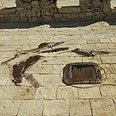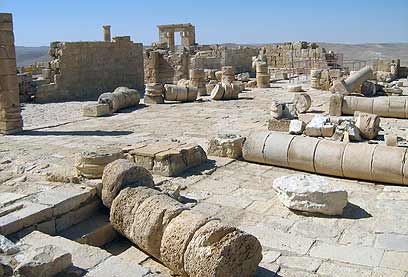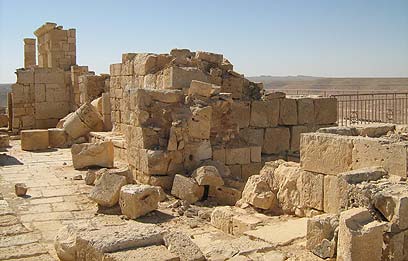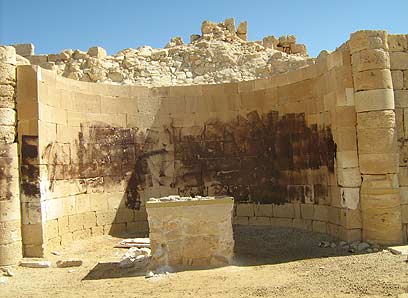
Avdat National Park vandalized
Hundreds of ancient artifacts found smashed; walls smeared with paint in ancient Nabataean city. 'A World Heritage Site received a grave blow,' says chairman of Parks Authority. Two Bedouin suspects arrested, including site's guard
The Negev hills site of the southern ancient Nabataean city of Avdat, which was declared a World Heritage Site by UNESCO in 2005, was found vandalized Monday.
Hundreds of archeological artifacts were found smashed, walls smeared with yellow and brown paint, and oil paint was smeared on the ancient wine press. Items hundreds and thousands of years old were severely damaged.
Dimona Police arrested two Bedouins, aged 41 and 57, for their alleged involvement in the act. The police said Tuesday morning that one of the men arrested was the site's guard.
In addition to the vandalizing of the National Park, "Sfat Midbar" farm near Mitzpe Ramon was also damaged. Dimona Police forces launched an investigation, saying they will look into all possible leads, including the recent destruction of 23 Bedouin structures nearby, and will examine a possible connection between the two incidents.

Shattered columns in Avdat (Photos: Orit Bortnik, Nature and Park Authority)
"Tonight, a World Heritage Site received a grave blow. The Authority, which is charged with protecting this historic asset, will act immediately to restore the site to its previous condition as is required by international standards," Chairman of the Israeli Nature and National Parks Protection Authority Eli Amitay told Ynet.

'Grave blow'
Raviv Shapira, director of the southern district of the Israel Nature and Parks Authority told Ynet that the sight of the destruction was awful: "We came in the morning and found the place in shambles," described Shapira, "They broke the staircase, destroyed the walls, and painted on them. The worst is that the two most ancient churches in Israel were destroyed, and 13-foot columns were shattered with hammers along with artifacts and the authentic marble alter, which is the most important (artefact) in the city."

Walls smeared with paint
The Nabataeans founded Avdat around the 3rd century BC, along the "Perfume Road" which stretched between the Jordanian city of Petra and Gaza. The place was named after the Nabataean king, Avdat, who was also buried at the site. According to Shapira, Avdat was the most important historic city on the "Perfume Road" after Petra between the 1st century BC and the 7th century AD, and was inhabited by Nabataeans, Romans and Byzantines.
Additional damage was discovered by the Nature and Parks Authority staff, including damage to orchards, water pipes and visitors' vehicles. The Nature and Parks Authority is set to increase the number of supervisors patrolling its sites during the intermediary days of the Sukkot holiday, and will also deploy aircraft which will allow aerial supervision of visitors' activities.
Daniel Bar-Eli, secretary-general of the Israeli committee to UNESCO, called the act "a crime against humanity's culture."
Thousands of visitors come to the site during the intermediary days of the Fall holiday, however this year they will not be able to enjoy the beauty and antiquities of the place.
Israel Nature and Parks Authority has reopened the World Heritage Site, Avdat, for visitors.
Ilana Curiel contributed to this report










